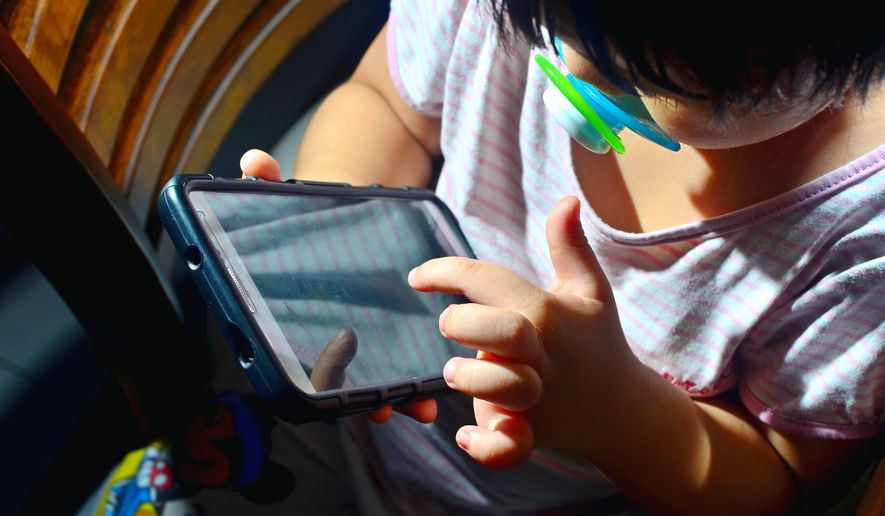Lawmakers are eager to crack down on Big Tech for its platforms’ alleged harm to kids as a growing number of senators craft proposals to change the way tech companies’ digital products interact with children.
Teenage suicide, addiction and sexual abuse are among the digital-fueled dangers that senators pinned on Big Tech during a Senate Judiciary Committee hearing Tuesday.
Sen. Richard Durbin, Illinois Democrat, held up a smartphone and said it was addictive and threatening to kids’ well-being. The judiciary committee chairman said the online world offers opportunities and benefits but also creates serious risks for children.
“In the virtual world, criminals and bullies don’t need to pick a lock or wait outside the playground to hurt our kids; they only have to lurk in the shadows online of Facebook and Snapchat,” Mr. Durbin said. “In those shadows, they can bully, intimidate, addict or sexually exploit our kids right in our own homes.”
A greater percentage of teenage girls feel sad or hopeless than at any time in the past decade, according to new data published Monday by the Centers for Disease Control and Prevention. Some 57% of teen girls surveyed by the CDC felt persistently sad or hopeless in 2021, nearly double the percentage of boys who felt similarly, according to the survey.
A bipartisan appetite exists for new legislation to curb tech platforms and social media companies’ relationships with child users, but a primary approach has yet to emerge.
Sen. Lindsey Graham, South Carolina Republican, said at Tuesday’s hearing that he has begun working with Sen. Elizabeth Warren, Massachusetts Democrat, on a new bill.
“We have pretty divergent political opinions, except here,” Mr. Graham said. “We have to do something, and the sooner the better. We’re going to approach this from consumer protection, we’re going to look at a digital regulatory commission that would have power to shut these sites down if they’re not doing best business practices to protect children from sexual exploitation online.”
Mr. Graham said American consumers are virtually unprotected from social media abuse, with young people the most exposed and parents feeling helpless.
Mr. Graham and Ms. Warren are not the only bipartisan odd couple working on bills intending to better protect children on the internet. Sens. Marsha Blackburn, Tennessee Republican, and Richard Blumenthal, Connecticut Democrat, pushed a bill last year to give parents more tools to make decisions about their digital behavior.
The Kids Online Safety Act advanced through the Senate Commerce Committee last year but failed to become law, and its bipartisan authors want to see it advance.
“We got close last time and we almost got it through the finish line and we didn’t, so new Congress, a new start on this,” Ms. Blackburn said at the hearing. “And we’re so pleased that judiciary committee is working with us, with commerce committee, and we hope to get it on.”
Mr. Graham said more bills are being proposed on digital harm to kids than on any other subject. Sen. Josh Hawley, Missouri Republican, added a pair of proposals Tuesday, including one to impose an age restriction for kids’ social media usage.
The Making Age-Verification Technology Uniform, Robust and Effective (MATURE) Act would force social media platforms to verify users are age 16 or older, including by requiring platforms to collect a “scan, image or upload of government-issued identification of the individual,” according to the draft legislation.
Not everyone believes that tech companies are the main cause of kids’ dysfunction, pointing to things like COVID-19-related restrictions from governments and parents preventing social interaction and schooling in recent years.
Brown University assistant professor of psychiatry and human behavior Jacqueline Nesi wrote last month that social media platforms on their own do not cause mental health issues but they can exacerbate problems for kids.
“Yes, certainly, for some teens social media might act as one stressor that contributes to a larger system of risk for mental illness,” Ms. Nesi wrote on her Techno Sapiens blog on Substack. “But does using social media, on its own, cause mental illness in teens? No.”
The American Psychological Association told the Senate Judiciary Committee on Tuesday that pre-adulthood use of technology and social media “may be particularly concerning.” APA chief science officer Mitch Prinstein wrote to the committee that social media usage may also promote a psychological affinity for dangerous and risk-taking behavior.
Tech companies did not make an appearance at Tuesday’s Judiciary Committee hearing, but Mr. Durbin said they would be invited to participate in the future. The committee heard testimony from advocates for new laws, including from a grieving parent whose child committed suicide after getting cyberbullied and from the National Center for Missing & Exploited Children.
In response to Mr. Durbin’s criticism, Meta said in a statement that it wants kids to be safe and touted the development of more than 30 tools to support teens and families, including providing supervisory tools for parents. The company also said it does not allow content promoting suicide, self-harm or eating disorders.
Snapchat said its users’ well-being is most important and it is constantly evaluating how to make the platform safer. The company said it uses human moderation to review content before it can reach a large audience as one tool to help reduce the spread and discovery of harmful content.
• Ryan Lovelace can be reached at rlovelace@washingtontimes.com.




Please read our comment policy before commenting.